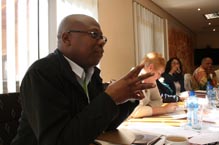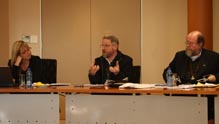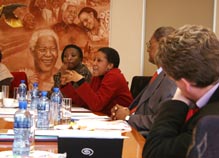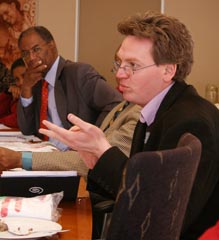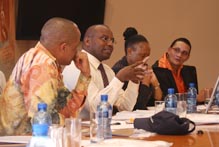
From left, Jean Pierre-Kalala, Ken Mutuma, Dr Mothomang Diaho and Bea Abrahams at the Social Cohesion Reference Group
July 17, 2009 – Media stereotypes about migrants and the need for government to condemn violence more strongly were discussed at the first meeting of the Social Cohesion Reference Group at the Nelson Mandela Foundation yesterday.
Following the xenophobic attacks in South Africa in 2008, the Nelson Mandela Foundation initiated a series of “social cohesion dialogues”, also often referred to as “community conversations” across the country, aimed at engaging people to talk to one another about the underlying causes of violence and how to avoid it.
The dialogues are conducted under the auspices of the Foundation’s Dialogue Programme by facilitators who are trained by the Foundation, and aim to create a safe space for dialogue and to empower communities to talk about difficult issues, and ultimately to solve their own problems. The dialogues will continue for a period of two years.
The Social Cohesion Reference Group is made up of representatives from the Foundation, faith-based organisations and other NGOs working in media and social justice, among others.
Mothomang Diaho, head of the Dialogue for Justice Programme at the Nelson Mandela Foundation, introduced the Community Capacity Enhancement (CCE) methodology that underpins the community dialogues to the group, which meets in an advisory capacity on the dialogues. “This programme gives focus back to the power of conversations; it allows the community members themselves to come up with solutions,” she said. The methodology was adopted by the United Nations Development Programme (UNDP) as a way of working with communities.
“Social cohesion starts with the individual, so that the individual can influence others,” said Diaho, adding that in order to take the project further, there was a need to share what has been learnt and not underestimate the challenges.
Bea Abrahams, one of the implementing partners and trainers for the social cohesion dialogues, said, “We need to understand why violence occurs in order to create a space where relationships can be built within communities.
“We have designed a programme that looks at the causes of violence within communities, with a focus on last year’s xenophobic attacks. We need to understand what drives community members to be violent towards one another,” explained Abrahams. She reflected that interventions should be based on behavioural patterns, teaching people to embrace one another, and to look at the world differently. This should mobilise the communities to deal with the problems they are facing.
Two main challenges to the success of the project have been the media and government’s relative lack of understanding or involvement. Another implementing partner, Ken Mutuma, said, “There is a disjuncture between government structures and community leaders.” The communities involved in the project expressed a lack of confidence in government structures, which makes the path to achieving social cohesion difficult. He said there were often non-governmental community structures which acted as powerful gatekeepers and sometimes obstacles to engaging with communities.
The media’s coverage of last year’s xenophobic attacks sparked debate among the committee members. William Bird from the Media Monitoring Project explained how the media often stereotype migrants incorrectly. “We need to get the media involved in the conversations, because they aren’t giving South Africa what it needs,” he said. This would be achieved by building relationships within the media, and teaching them how to report on these matters correctly. “Integrating the media in the components of the project creates a powerful structure,” said Bird.
Paddy Nhlapo, whose company, Cool Ideas, has been involved in a similar dialogue programme with the Foundation which addresses issues relating to HIV/AIDS in particular, stressed the importance of strengthening relations with community media in particular. “Let’s call on Capricorn fm and Zibonele fm [community radio stations] and forget about the big guns,” he said.
Bishop Paul Verryn of the Methodist Church added that not all media exposure is positive. “We need to be careful in our approach,” he said.
The project faces complex issues which need a collective response. It was stressed that government’s involvement was necessary and important for the project’s success. “We need government to comment and put out the message that if you lift a finger against a foreign national the full weight of the law will fall upon you,” said Verryn.
Jean Pierre-Kalala, from Sonke Gender Justice Network, emphasised the need for healing processes. “Within refugee and migrant communities, a healing process needs to take place. We come to South Africa with our own ethnic differences, so we need to talk openly and embrace each other,” he said.
The reference group will meet again in December 2009.
The Nelson Mandela Foundation and its partners will convene a Community Conversation this weekend on Mandela Day in Khayelitsha’s Site C. There will also be a conversation held in Attridgeville as a follow-up to a conversation held there on June 20, World Refugee Day. The Attridgeville community will also hold a cleansing ceremony on Mandela Day.
Reflections:
“We need to go into this knowing that communities can solve their own problems. We are only there to enhance the capacity to do this, so let’s walk the talk and be the change we want to see.” – Paddy Nhlapo, Cool Ideas CEO
“This is a creative initiative with huge potential. It is a welcome platform for South Africans and migrants to find each other; there is a deep need for healing.” – Father Michael Lapsley, director of the Institute for Healing of Memories
“It is an awesome methodology that brought people with common interests into one room. South Africa needs to dialogue and each individual needs to become an agent of change – in that way we will heal the nation.” – Ncedisa Gcobo, International Organisation for Migrants
